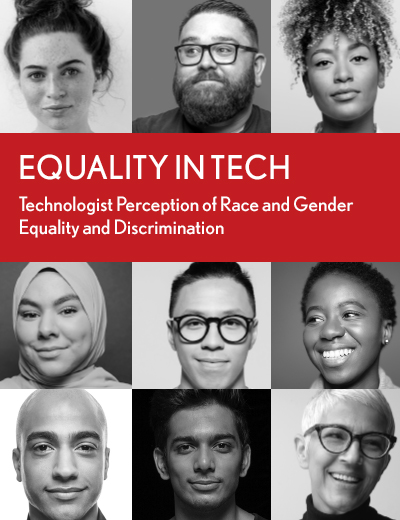
Recent calls for racial equality and inclusion have sparked actions from some of the largest organizations in tech. These actions, in turn, have taken many forms, from releasing annual diversity reports to re-examining recruitment processes and identifying potential areas of bias. As part of the Equality in Tech Report, we collected information from over 9,000 technologist to capture their thoughts on employer responses to calls for greater equality in tech.

The Equality in Tech Report
Over 9,000 technologists have spoken. Access the report now and see what they said.
Action to Date
But when it comes to how impressed technologists have been with these actions, less than half of respondents across all groups stated that they were either extremely or moderately impressed. The data on lack of satisfaction with these efforts offers additional insight. Specifically, Black (21 percent) and Hispanic/ Latino(a) (21 percent) respondents said they were not impressed at all with recent efforts. In contrast, 15 percent of White technologists, 13 percent of Asian/Pacific Islander technologists and 9 percent of Asian Indian technologists said the same.
Policy Change
According to our data, technologists generally assign importance to their company making policy changes that support the Black Lives Matter anti-racist and inclusion movement, though at significantly different rates depending on their race. Seventy-one percent of Black respondents said these changes were either extremely or moderately important – the
highest response of any group. This was followed by Asian Indian (57 percent), Hispanic/Latino(a) (50 percent), Asian/Pacific Islander (48 percent) and White respondents (43 percent). While the data shows varying levels of importance for these types of policy changes, creating any lasting change means these policies must be perceived as important by all employees and members of leadership, not just those most impacted.
Reputation
When it comes to applying for jobs at certain companies, do technologists care about an organization’s reputation for diversity, equity and inclusion? Short answer, yes. Although the range of perceived importance varies by group, only a small percentage of respondents assign no importance to a good corporate reputation in those vital areas. In fact, 65 percent of Black respondents, 53 percent of Asian Indian respondents, 51 percent of Asian/Pacific Islander respondents, 50 percent of Hispanic/Latino(a) respondents, and 41 percent of White respondents thought that a reputation for diversity, equity, and inclusion was an important factor in whether they would work for a particular company.
Given the high percentage of technologists who have witnessed discrimination, managers will have to do all they can to build a supportive and inclusive culture, which could mean pushing back against years of bad corporate habits. It can prove costly to spin up education programs for all employees on the importance of recognizing and calling out discrimination, as well as equity initiatives designed to tackle racial and gender disparities in the workplace. Not fixing a company’s reputation, however, can translate into a loss of valuable talent as technologists head for companies with more
inclusive cultures.
In addition, managers will need to advocate for changes in hiring and retention policies, which are necessary if a company wants a healthy pipeline of diverse talent. Companies can tie managerial evaluations into whether certain equity goals have been achieved; internal surveys and other feedback mechanisms can also help assure employees that their concerns are being heard.
It’s up to organizations to empower managers to help their team members feel valued over the long term, because the consequences of failure are enormous. Previous studies have shown that one-third of all employee turnover is due to ineffective management and a lack of development opportunities.* Given the competitive nature of the technology industry, companies can’t afford to lose valuable talent—and nor can they have a reputation as a place that doesn’t fully embrace diversity, equity, and inclusion.

